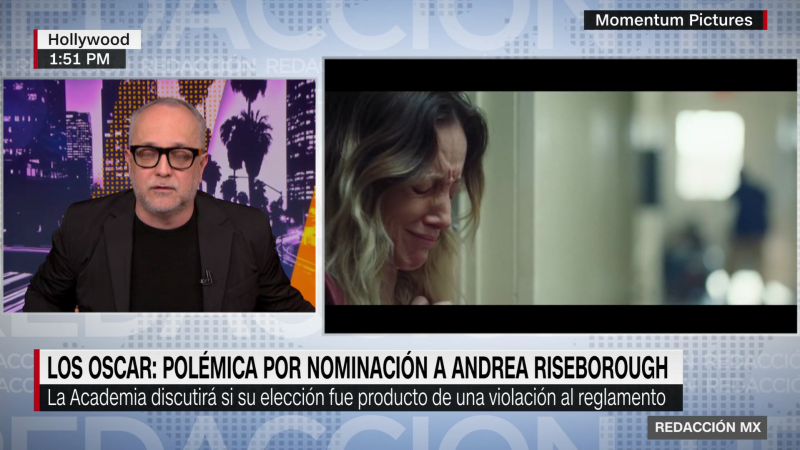
The Academy says that Riseborough’s Oscar nomination will stand
Why Riseborough should not have to win an Oscar: Social media criticism of a film about a girl who won the lottery or how to be an A-list star
Riseborough is in a film about a woman who won the lottery. Her nomination followed a social media campaign by high-profile A-list actors. Meanwhile, two Black actresses who had been thought to be Oscar contenders — Viola Davis in The Woman King and Danielle Deadwyler in Till — were not nominated. Following a public outcry, the Academy of Motion Picture Arts and Sciences said they would conduct a review of the campaign procedures around this year’s nominees.
This month, that changed when some of the biggest names in film threw their weight behind the movie. Paltrow praised the film on Instagram, saying Riseborough should win every award, including “all the ones that haven’t been invented yet.”
The film has been supported by various celebrities through screenings or moderated discussions.
Meanwhile, on Twitter, other actors have posted almost identical statements supporting the film, calling it a “small film with a giant heart.” Some have likened it to a copy-and-paste job.
This is not the first time an actor has attempted an Oscars push alone. A decade ago, actress Melissa Leo staged her own photoshoot and took out her own “For Your Consideration” advertisements. At the time, she was nominated for a best supporting actress award for her role in The Fighter.
Industry-watchers have noted that soliciting votes is often done to level a playing field – in this case, bring attention to a small-budget, little-known film. The push now is on social media, instead of being done in private.
And yet, not every actor has the kind of connections Riseborough does. Critics of the nominations have pointed out that Viola Davis (“The Woman King”) and Danielle Deadwyler (“Till”), two Black actresses who were considered frontrunners, were not nominated for the award. (Both films also drew larger audiences to the box office.)
The Academy’s diversity problem has long been discussed and dissected. And while Riseborough is not at fault for the snubs, some have pointed out that the campaign behind her displays just how much of an advantage it is to have famous White friends.
Christina Ricci, star of the Emmy-nominated show “Yellowjackets,” called the Academy’s decision to review the procedures “very backward,” in a now-deleted Instagram post.
It is difficult to say whether Riseborough’s nomination will be overturned. Bruce Broughton got an Oscar nomination for the title song of “Alone Yet Not Alone” but was disqualified from the event because of his campaign.
The other people in the same category are Riseborough, Michelle Williams, Ana de Armas, Annette O’Reilly, and Tr.
The Academy of Motion Picture Arts and Sciences has decided to keep her nomination for best lead actress for her performance in the Independent drama, “ToLeslie.”
The Academy Wars: A History of Hollywood in Gold, Sweat and Tears (with an Appendix by J. N. Weinstein)
“However, we did discover social media and outreach campaigning tactics that caused concern,” the statement added. “These tactics are being addressed with the responsible parties directly.”
The Academy’s statement did not specify which rules may or may not have been broken in the course of the campaigning that took place on the film’s behalf.
The core values of the Academy are being ensured by the academy’s campaign regulations. “Given this review, it is apparent that components of the regulations must be clarified to help create a better framework for respectful, inclusive, and unbiased campaigning.”
In his new book, Oscar Wars: A History of Hollywood in Gold, Sweat and Tears, Schulman writes about the behind-the-scenes battles viewers don’t see on Oscar night. The Academy of Motion Pictures was scarred by anti-communist hysteria and blacklists. The #OscarsSoWhite movement challenged theAcademy to confront its own biases and blind spots.
There is a mistake to see the awards as a gauge of artistic merit or worth. Instead, he says, “There are a million other factors that go into who gets nominated and who wins.”
Oscar campaigning used to place ads in trade magazines “for your consideration,” as well as in Variety or whatever. And people having maybe some private screenings at their homes in Beverly Hills. What Weinstein did was basically leave no stone unturned. He would not just blanket the airwaves and the papers with advertisements, but he would, for instance, find out where particular Academy members lived. He would try to get three people from the Academy who were living in Santa Fe to go for a screening there. And he would find little pockets of Academy members. There were nonstop events, all the time.
The campaigns culminate on Oscars night, in a glitzy ceremony held in Hollywood’s Dolby Theater, and televised around the globe. It’s a long ways away from the Academy Awards, which were handed out in a small ceremony at the Roosevelt Hotel in Los Angeles on May 16, 1929.
“What fascinates me about the very first Oscars is even at the beginning … “Hollywood was on shaky ground,” he says. “For instance, The Jazz Singer, the groundbreaking talkie that basically killed off the silent movies had just come out and it was given an honorary award because the Academy felt it couldn’t even compete with all the other nominees, which were silent films. All of the nominees for the second Academy Awards had sound.
In the book, I attempted to psychoanalyze the Oscar years and put them on the couch. And these moments of transition and these moments of instability are always so fascinating.
All of the acting nominees were white for the second year in a row. And an activist named April Reign had started a hashtag the year before, which was, “#OscarsSoWhite they asked to touch my hair,” and that got some pick-up in 2015. And in 2016, it went absolutely viral. There was a lot of attention paid to the whiteness of the people that are in the academy and who are voting.
It has made a difference. I mean, one of the underappreciated things about these reforms was that the Academy became much more international. And I think you start to see that reflected in a win like Parasite a few years ago. Hollywood has become much less of a factor in theAcademy’s assessment of movies. But of course, the controversy has not died down. The best actress category is what we see this year. This is a great year for Asian nominees: Michelle Yeoh and Hong Chau, all the people from Everything Everywhere All at Once. And yet there is still no Black actress nominated. There has not been a best actress winner who is a person of color since Halle Berry won the first and only one in 2002, and there are no female directors nominated this year. I don’t think this is a problem that has been solved. Like the larger issue in American life over inclusion and representation, it’s kind of an ongoing battle.
My Left Foot with Daniel Day-Lewis and Harvey Weinstein: After the Oscars, the Academy of Screen Writers Guild (now known as DreamWorks)
He has a knack for creating stunts that will get a lot of publicity. For instance, when the English Patient was out, he staged an entire evening at a town hall in New York City with people reading from the book. … But then he would also find ways to sort of create humanitarian campaigns out of his movies. Famously, My Left Foot with Daniel Day-Lewis, he brought the movie and Daniel Day-Lewis to Washington and screened the movie for senators.
On Harvey Weinstein’s infamous Oscars campaign for
Shakespeare in Love
to beat Steven Spielberg’s
Saving Private Ryan
for Best Picture in 1999
The campaign was so ugly because of Weinstein being negative about Saving Private Ryan and the journalists being told that Saving Private Ryan was only good for the first 25 minutes. This went to the company called DreamWorks.
For instance, if the writers were negotiating a contract with the studios, … the Academy would sort of oversee the contract rather than a labor union doing it. In its first ten years, the Academy was seen as an opponent by the kind of rank and file in Hollywood who felt it was trying to pre-emptively unionize. The Screen Writers Guild and the Screen Actors Guild became part of the labor movement during the ’30s and went to war with the Academy. They would tell their members to resign from the Academy en masse. They would boycott the ceremony. There was a question about whether this young Academy would survive.
It got to the point where the president of the Academy at the time, the director, Frank Capra, realized how toxic this all was. And he loved the Academy Awards. He said that the Academy was no longer going to do any of that, such as negotiating conflict resolution, economics or contracts, and that they would just not do it anymore. And so they really shed a lot of their original purpose. And what they preserved was the Oscars, which was the only thing that the Academy did that pretty much everyone in Hollywood liked.

